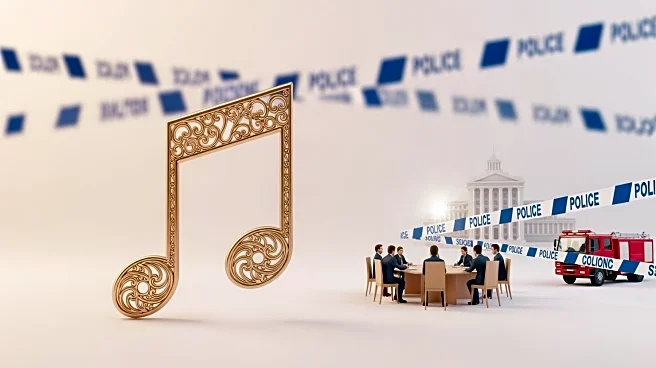What's Happening?
Taylor Swift has released her 12th studio album, 'The Life of a Showgirl,' which has sparked significant backlash from both fans and critics. The album's release was accompanied by a wide array of merchandise,
including 'The Shiny Bug Vinyl Collection' and 'Showgirl Cardigan Boxed Set,' which many fans found excessive. The music itself received mixed reviews, with some critics describing it as cringey and less compelling than her previous work. NPR music critic Ann Powers suggests that Swift is intentionally embracing a villainous persona as part of her artistic strategy. Despite the criticism, Swift has expressed respect for diverse opinions on her art, stating, 'I’m not the art police.'
Why It's Important?
The backlash against Taylor Swift's latest album highlights the challenges faced by artists who reach a high level of fame and wealth. Swift's approach to marketing and her continued use of autobiographical themes have drawn criticism in a cultural climate increasingly critical of wealth and privilege. This situation underscores the broader societal tensions around celebrity culture and the expectations placed on public figures. The mixed reception of her album could impact Swift's brand and influence her future artistic direction. Fans and critics alike are questioning whether an artist can continue to produce relatable art when they are perceived as being out of touch with the struggles of everyday life.
What's Next?
Taylor Swift's response to the backlash will be closely watched by fans and industry observers. Her ability to navigate this criticism could influence her future projects and public image. It remains to be seen whether Swift will adjust her marketing strategies or artistic themes in response to the feedback. Additionally, the music industry may take note of the public's reaction to Swift's merchandising approach, potentially influencing how other artists release and promote their work.
Beyond the Headlines
The controversy surrounding Taylor Swift's album release raises questions about the sustainability of celebrity-driven consumerism. As fans become more critical of excessive merchandising, artists may need to reconsider how they engage with their audience. This situation also highlights the evolving relationship between artists and their fans, where transparency and authenticity are increasingly valued. Swift's experience may prompt other artists to reflect on their own public personas and the narratives they choose to share.











